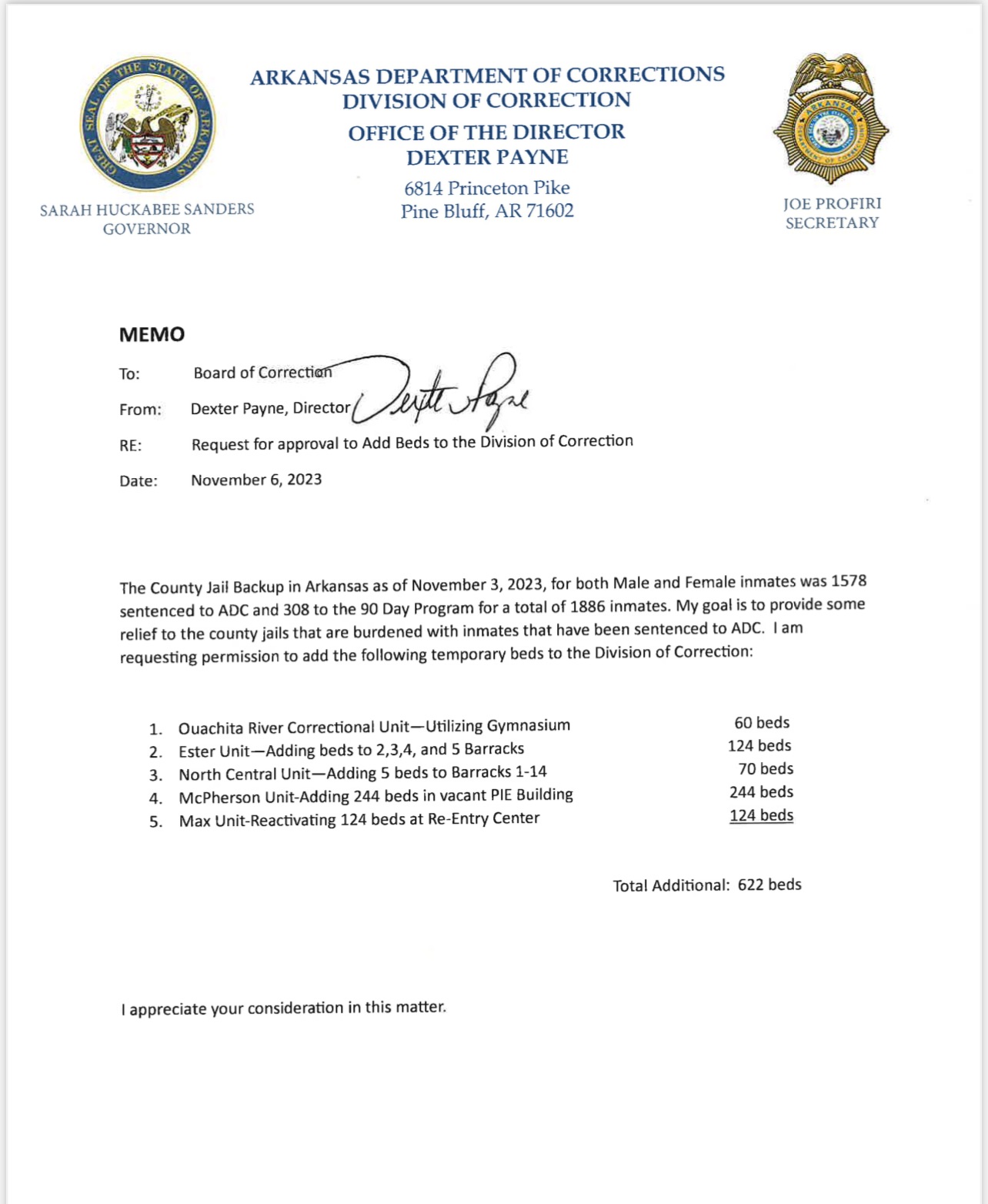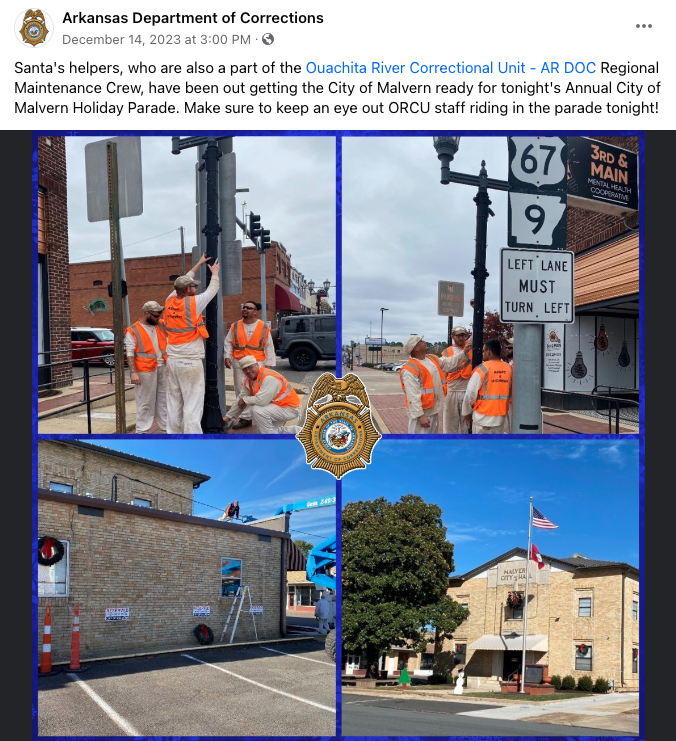This article is Part 3 of an ongoing series called #ARCorrectionsCrisis, which focuses on the dysfunction of the Arkansas Board of Corrections. We intend to track their actions and educate the public about their conduct until they finally prioritize Arkansas crime victims and the safety of our communities above their own power.“
As Arkansas continues to face an unprecedented crime crisis, the Arkansas Board of Corrections is gripping tighter and tighter to their power. In their most brazen act yet which may very well come back to bite them”the Board fired Secretary of Corrections Joe Profiri, alleging Profiri showed “public disdain“ for their authority.
What exactly did Profiri do? He presented a plan to utilize vacant space in Arkansas prisons to house more inmates, rather than continuing the Board’s preferred policy of turning criminals loose well in advance of their eligible release dates.
The Board, on the other hand, argues state prisons are understaffed and over capacity; they even produced an audit to justify their claims.
Profiri & the Sanders administration have argued that there is physical space available. Profiri even presented a plan.
But are Arkansas prisons really bursting at the seams? And is Corrections so understaffed that they cannot possibly take in more inmates? Let’s dig in.
PHYSICAL SPACE EXISTS TO ADD MORE PRISON BEDS
As of earlier this year, Arkansas’s prisons are up to 108 percent capacity. Data from recent years suggests this is a problem that has steadily gotten worse (which raises the question, “Why hasn’t the Board of Corrections solved this problem?”) But just because Arkansas’s current prison beds are full, that does not mean there is absolutely no physical space available for additional beds to be added.
Case and point: Secretary Profiri, before his suspension, suggested adding 622 beds within existing Corrections facilities. Some of the beds Profiri proposed opening had been, for some reason, closed previously by the board.
Here’s a letter from one of his deputies, Dexter Payne, dated November 6, 2023:

As made clear by Payne’s letter, physical space does exist and there is a reasonable way to add additional space. But the Board said no.
Why? Well, according to their leader, Chairman Benny Magness, adding additional space would put prisoners‘ safety at risk. And, according to an audit Magness had produced by Tommy James, a DOC employee previously dismissed for falsifying records, there are serious concerns about the effect additional inmates might have on DOC sewage systems. (The horror!)
In short, it appears much of the capacity crisis has been self-imposed by the Board’s own mismanagement.
And what the Board of Corrections regrettably fails to acknowledge is that their decisions do not occur in a vacuum. There are tradeoffs for the decisions they make, and there are consequences.
Instead of choosing safe streets, Magness and the Board are choosing safe sewers.
Of course the Board of Corrections knows physical space exists to open more beds–and that is precisely why they have pivoted to citing an allegedly historic “staffing shortage” as the reason they cannot confine more criminals. Those claims are similarly, well, suspect.
STAFFING SHORTAGES HAVE DECLINED IN RECENT MONTHS
Board of Corrections Chair Benny Magness is also adamant that additional prison beds cannot be opened because of allegedly historic “staffing deficits.” This claim should also be treated with suspicion. What truth is there to his claim that “We are currently experiencing staffing deficits unlike any other time in our history”?
The alleged staffing issues have been at a critical point for at least a year and a half, which immediately calls into question their unprecedented nature–and of course, Chairman Magness might should look in the mirror, as the person who has presided over these allegedly historic staffing shortages, and take some ownership.
But perhaps most importantly, since Gov. Sarah Sanders and Secretary Profiri took office earlier this year, the vacancy rate for correctional officers has actually declined, significantly. In fact, correctional officer vacancies have declined by more than 17 percent.
This fact is notably missing from Magness’s seven-page letter to the governor.
Certainly more jobs need to be filled and the safety of Corrections officers should be a top priority. But at minimum, as staffing vacancies go down, bed capacity should be steadily increasing. The Board should also more closely consider the tradeoffs of their decisions here because, once again, by declining to open more bed space, they are choosing to perpetuate Arkansas’s crime crisis and keep more criminals on Arkansas’s streets.
Rather than complaining about the problem, perhaps the Board of Corrections ought to do something about it by reallocating officers.
OFFICERS SHOULD BE REALLOCATED TO KEEP ARKANSANS SAFE
They could start by looking at the exorbitant amount of staff time eaten up by “regional maintenance,” where inmates are shepherded off site to complete tasks like community service. It sounds like a good idea in theory, but the nearly 45,000 hours worth of regional maintenance performed each month requires Corrections staff to depart from their posts at facilities, contributing to the understaffing problems behind prison walls.
Additionally, inmates require even more staff to supervise them in public compared to inside facilities, further compounding the staffing problem. This is just one of many starting places the Board should look to address its self-imposed staffing crisis.
A quick look at Corrections’ social media accounts reveal some of the projects inmates have been taking on, including being “Santa’s helpers” by hanging up Christmas lights and cleaning up local parks:


Perhaps these are fine things to do during normal times (in addition to being a nice way for the Board to dole out political favors to local counties and cities, particularly as these localities get more strained and stressed by jail overcrowding). But these are not normal times, as Arkansas faces a crime crisis. These activities should, at a minimum, not be prioritized over opening additional prison beds and keeping Arkansans safe.
And it seems only appropriate that these crews be put on pause and officers left in Arkansas prisons until our crime crisis subsides.
THE CORRECTIONS BOARD MUST OPEN MORE PRISON BEDS
Ironically, the Board of Corrections need only look in the mirror when searching for the cause of these alleged staffing issues. As a member of the Board of Corrections for more than two decades”including as chair for a majority of that period”the consequences of the failed policies of the past rest squarely on Magness’s own shoulders. In his 20-plus years on the Board, what has Magness done to alleviate staffing shortages that are now, according to his own words, worse than ever?
When it comes to prison capacity and staffing, Arkansans are entitled to honest answers. Here’s the reality: The same status-quo bureaucrats that have presided over a critical capacity shortfall in the state’s prisons are now blaming a manufactured staffing crisis for why they cannot act. At best, the staffing crisis is a product of their own failed policies. At worst, it’s a failure to acknowledge meaningful progress in reducing staff turnover at Arkansas’s prisons.
In either case, yet again, the Board of Corrections is playing fast and loose with the truth. It is long past time for the Board to own up to its mistakes, acknowledge the staffing improvements made by the Sanders administration, and step up as a willing partner, rather than an obstacle, to help solve Arkansas’s crime crisis.


